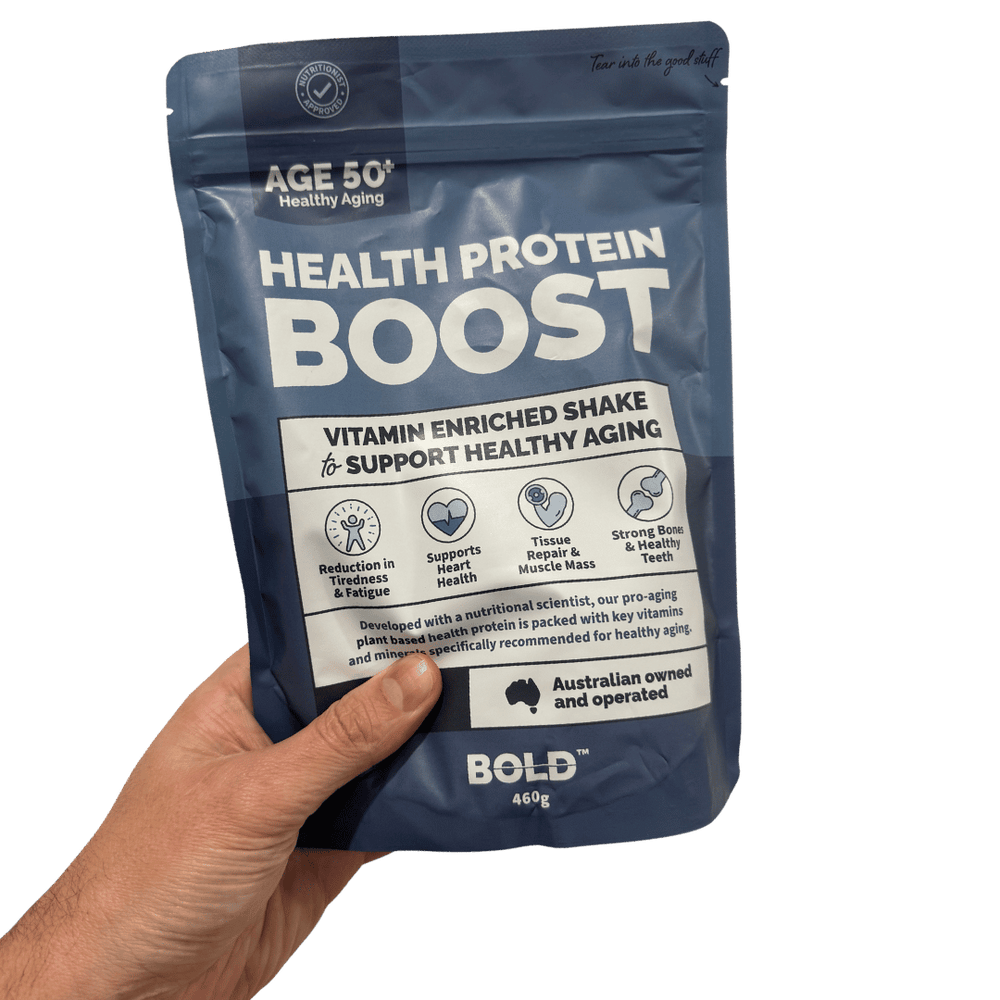How to reduce sarcopenia (muscle loss) through nutrition and exercise
Maintaining muscle mass for healthy aging

Topics covered:
- What is Sarcopenia
- Getting enough protein in your diet
- Vitamin D to help strengthen bones
- Omega-3 fatty acids
- Lifestyle factors that can prevent sarcopenia
As you age, many changes occur in your body. One of the biggest changes is a loss of muscle mass and strength and can lead to a condition called Sarcopenia. This can cause weakness, difficulty moving around and can be really debilitating. The good news is there are steps you can take to reduce your risk!
There is increasing evidence that links nutrition to muscle mass, strength and physical function. More specifically protein, vitamin D, omega-3 fatty acids and physical activity are key factors for helping maintain healthy muscles and bones to reduce sarcopenia.
In this post, we’ll help you understand the condition, what lifestyle measures you can take to help prevent or slow its progression and the best nutrition for sarcopenia.
What is Sarcopenia
Sarcopenia is a loss of muscle mass and strength that generally occurs as a part of the natural aging process. This decrease in muscle mass and strength however can lead to an increased risk of falls or fractures, especially if you already have osteoporosis.
It can harm one’s quality of life and impact their day-to-day activities. For example, it’s estimated that almost 20% of women and 10% of men over 65 years are unable to lift a 4.5kg weight or even kneel down.
Surprisingly, on average people will lose up to a whopping 50% of their muscle mass by the age of 80!
Sarcopenia can begin as early as age 30 for some people but typically begins around the mid-50s. For those that experience it at a younger age, malnutrition, immobility or serious diseases like late-stage cancer are usually the cause.
Getting enough protein in your diet
Protein is the main nutrient responsible for building and maintaining muscle mass. Research shows getting enough protein in your diet may significantly prevent or reduce sarcopenia.
Unfortunately, as we get older, our ability to absorb protein seems to also be reduced. A study showed that older adults may need as much as 70% more than younger adults. So, for this reason, it's important to eat sufficient amounts of high-quality protein like BOLD Health Protein Plus at each meal.
It’s been estimated that 38% of men and 41% of females have a daily protein intake below the recommended amount. Older adults should be aiming for 1.2g - 2g or more of protein per kilogram of their weight per day.
Alternatively, some individuals may find it easier to look at their protein intake as a percentage of their overall diet. In this context, experts suggest 10-35% of your dietary intake should be protein.
Vitamin D to help strengthen bones and muscle fibres
Surprisingly, Vitamin D deficiency is a common health problem worldwide. Even in sunny Australia, it is estimated that 1 in 4 people have a vitamin D deficiency. The older population are particularly at high risk due to a low dietary intake and reduced sun exposure (a primary way of synthesising vitamin D).
So why is Vitamin D important for preventing sarcopenia? Vitamin D has several roles it plays in the body to ensure healthy muscles and bones. Firstly, it is needed for generating new muscle fibres and for maintaining muscle strength. It also helps us absorb calcium from our food and into our bloodstream where it can then be used. Lastly, it works with calcium to initiate the bone-building and remodelling process.
There are now numerous studies that have shown adequate levels of Vitamin D is essential for improving muscle strength, function and physical performance. By maintaining optimal vitamin D levels, individuals may be able to reduce sarcopenia or prevent it altogether.
To enable these optimal levels, it is suggested that adults get enough sun exposure to their arms and legs. In the hotter months when the UV index is above 3, just a few minutes a day is enough. When the UV index is below 3, people may need to be outside a little longer to get adequate amounts and also generally don’t need to use sun protection. Vitamin D supplementation may also be required during the winter months or for those that are unable to get outside.
Omega-3 fatty acids
There is growing evidence for the use of omega-3 fatty acids such as DHA, EPA and Lipoic Acid in managing those suffering from sarcopenia. This is because omega-3s have anti-inflammatory effects on the body.
It is thought that inflammation may be a potential contributing factor for sarcopenia. Therefore, targeting this inflammation may be a potential therapeutic approach for helping reduce sarcopenia symptoms.
At present, non-steroidal anti-inflammatories such as celecoxib and ibuprofen may be prescribed; however, these also pose potential unwanted side effects. Omega-3 fatty acids on the other hand have a lower side effect profile and may provide additional health benefits for older people such as bone health, eye health, cardiovascular health, and cognitive health.
Lifestyle factors that can prevent sarcopenia
Maintaining a healthy weight, daily exercise and managing stress levels are a few of the lifestyle changes that can help to prevent sarcopenia.
Exercise has been a long-standing treatment suggestion. Regular physical activity is known to promote muscle growth, maintain muscle mass and reduce muscle loss in sarcopenia patients. It also helps maintain a healthy weight range which is linked. Additionally, regular exercise has been shown to improve mood and lower depression rates which can be high in the older population.
The best physical activity to do is resistance training. Resistance training works by creating small tears in the muscle fibres, which is then followed by tissue repair, making your muscle stronger in the process.
It is important not to overdo it though. Over-exercising can actually have a negative effect on sarcopenia patients because it can increase symptoms such as inflammation, cramping and pain.
To Summarise
Sarcopenia is the age-related loss of muscle mass with an increased risk of falls, frailty and fractures.
Eating a healthy diet high in protein, adequate vitamin D levels, omega-3 fatty acids supplementation and regular physical activity are all ways to help reduce the impact of sarcopenia.


References
- https://www.sciencedirect.com/science/article/pii/S0261561417302996#:~:text=The%20nutrients%20that%20have%20been,long%2Dchain%20polyunsaturated%20fatty%20acids
- https://www.ncbi.nlm.nih.gov/pmc/articles/PMC4269139/
- https://www.ncbi.nlm.nih.gov/pmc/articles/PMC4066461/
- https://www.healthline.com/health/cachexia#:~:text=Overview,congestive%20heart%20failure%20(CHF)
- https://www.ncbi.nlm.nih.gov/pmc/articles/PMC4924200/
- https://www.ncbi.nlm.nih.gov/pmc/articles/PMC4924200/
- https://wiki.cancer.org.au/skincancerstats/Vitamin_D
- https://wiki.cancer.org.au/skincancerstats/Vitamin_D#Sun_exposure_and_vitamin_D
- https://www.cancer.org.au/cancer-information/causes-and-prevention/sun-safety/vitamin-d
- https://www.ncbi.nlm.nih.gov/pmc/articles/PMC4849483/
----------------------------------------------------------------------------------------------------------
Medical Disclaimer
The information provided in this blog post is for general information only, it is not intended as medical advice. For medical advice please consult with a qualified medical professional who is familiar with your individual medical needs.


